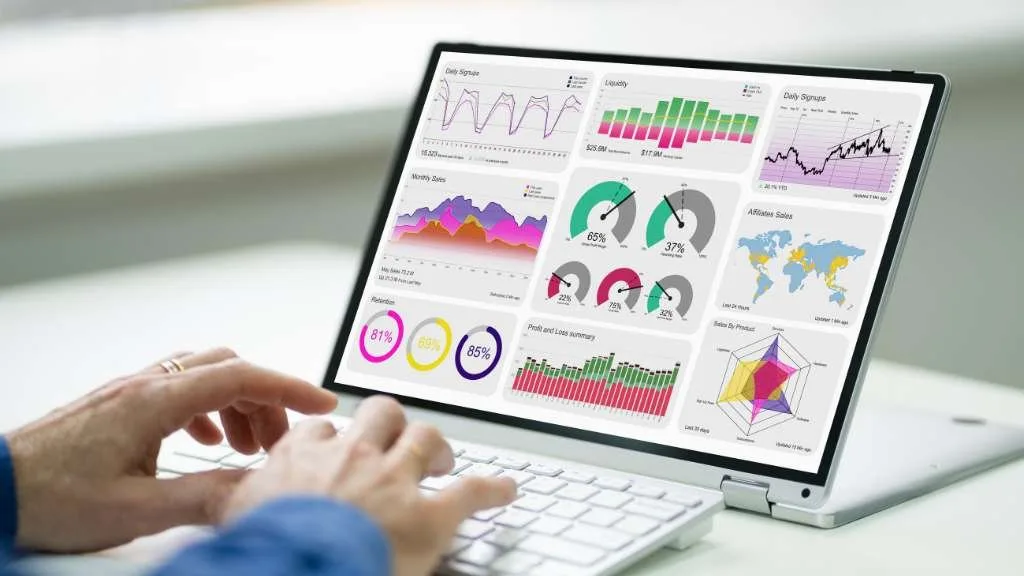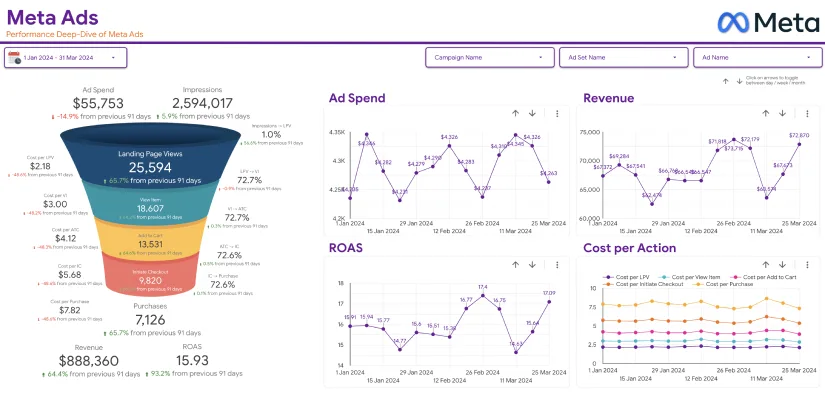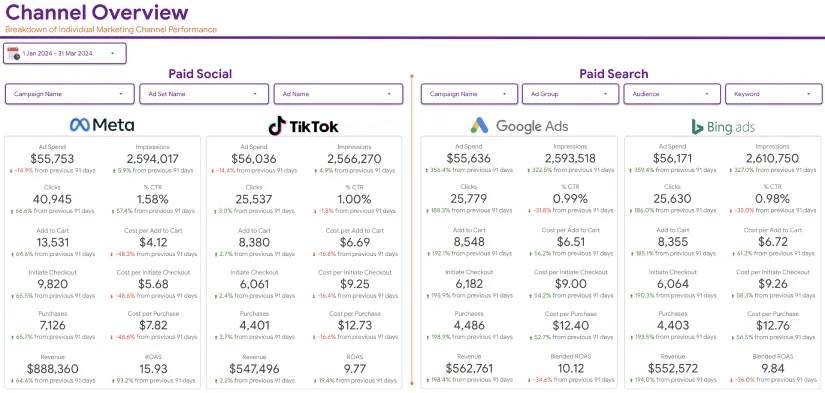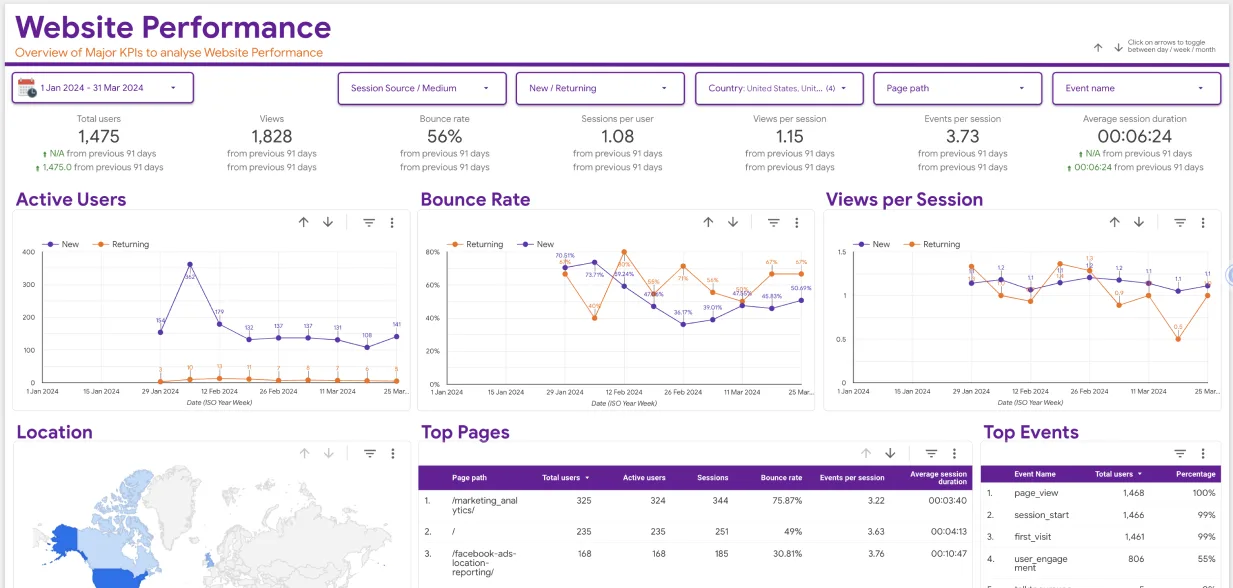Do you know why dashboards are important to businesses? These are some of the most supportive data visualization tools for companies. They generate high-level data that supports accurate decision-making and problem-solving. A dashboard is a practical instrument for measuring performance in every department.
It is more versatile and reliable than other data visualization tools. If you have never used any dashboard, read this article guide. It discloses the advantages of using dashboards for data analysis.
Why Dashboards are Important – 10 Benefits to Expect
A dashboard is the ultimate business tool to adopt if you are tired of using spreadsheets because it displays real-time data. This data reports the performance of various metrics. A business dashboard releases continuous snapshots of key performance indicators like customer satisfaction rate, sales revenues, profit margins, operational overheads, etc.
As it consolidates critical data insights into one area, a dashboard saves time and shows areas requiring urgent attention. Do you wonder why dashboards are important? Here is why:
1. Dashboards are Economical and Timesaving
Another cause why dashboards are important for companies is that they are cost-effective and timesaving. Data analysts and business intelligence experts can save time and concentrate on work that boosts results.
Dashboards automate data gathering and analysis, helping teams become more efficient and productive. Microsoft Excel spreadsheets were the only reliable visualization tools before dashboards. These spreadsheets required importing data from many sources, manually formatting regular reports, and fixing damaged APIs.
These spreadsheets increased the chances of human error happening and led to time wastage. Companies have now embraced dashboards, which has resulted in saving many hours when creating cross-channel reports.

Instead of spending hours upon hours updating these reports manually, teams can get automatic updates via dashboards. Thus, they can focus on more crucial business goals. One more fact showing why dashboards are important to organizations is that they consolidate data into one location.
2. Simplify Tracking of Key Performance Indicators
One factor explaining why dashboards are important tools for business management is the flawless tracking of KPIs. The departments in your business should use unique KPIs to track performance well.
A well-made business dashboard will let you measure the performance of KPIs for marketing, finance, HRM, sales, industry, etc. With a dashboard, your team can spot long-term patterns and trends, identify growth opportunities, and check overall health.
Since dashboards display data in an easy-to-interpret style, they can bridge the communication gap between departments. Having access to real-time figures and metrics can allow managers and departmental heads to identify KPIs that require some boost.
3. Consolidates Data into a Unified Place
A well-made dashboard data visualizer provides a unified place with truthful data about any matter. They can enhance transparency in your business because every worker can see how their contribution impacts the company. Through a user-friendly interface, managers can monitor the performance of all departments.
In the past, managers collected data from past quarters to create future forecasts. This manual work was difficult. It also drained their productivity and drive. After implementing dashboards, many managers have streamlined their internal operations.
They can now access tons of data in a single unified place. The storage place serves as the source of truth for all authorized users. Thus, one thing explaining why dashboards are important is they have come to reduce human error, and the hefty costs associated with correcting it.

4. Drives Engagement
Businesses wondering why dashboards are important need to examine their customer engagement levels. If customers feel satisfied and happy, they will engage with you in the future. On the other hand, poor engagement might cause customers to switch to a competitor.
Customer engagement is so crucial that no modern business wants to ignore it.
Most companies adopt dashboards because they generate accurate customer satisfaction scores. Dashboards enable your customer support team to use the most beneficial metrics to measure engagement levels. They simplify the assessment of customer feedback about a product or service and promote informed decision-making.
5. Enables Assessment of Business Goals
Why dashboards are important also entails assessing and changing your business goals. Real-time dashboards show the difference between pre-set goals and the actual results. This crucial insight can enable the top management to determine if some goals are feasible or useless.
Besides, dashboards cause organizations to create key performance indicators. Businesses without dashboards hardly create KPIs and have no methods of measuring their inputs and outputs. On the other hand, companies that use dashboard software can apply the most crucial metrics to measure performance.
That means they can tell where to spend the money and the results to anticipate. Another point on why dashboards are important is the prevention of resource misallocation. They let you focus on goals that require intervention. By aligning the long-term strategy with goals, your organization can achieve success.
6. Enhances Decision-Making and Problem-solving
Why dashboards are important concerns how they facilitate decision-making and problem-solving. A dashboard tool can show areas requiring instant improvement. Since dashboards arrange data in simple graphs and charts, even workers without technical know-how can interpret it.
Thus, dashboards expose issues that require immediate attention from decision-makers. They boost performance and profits by stopping issues from escalating to dangerous levels. Dashboards optimize performance by communicating urgent matters in time, which leads to more sales revenue and profits.
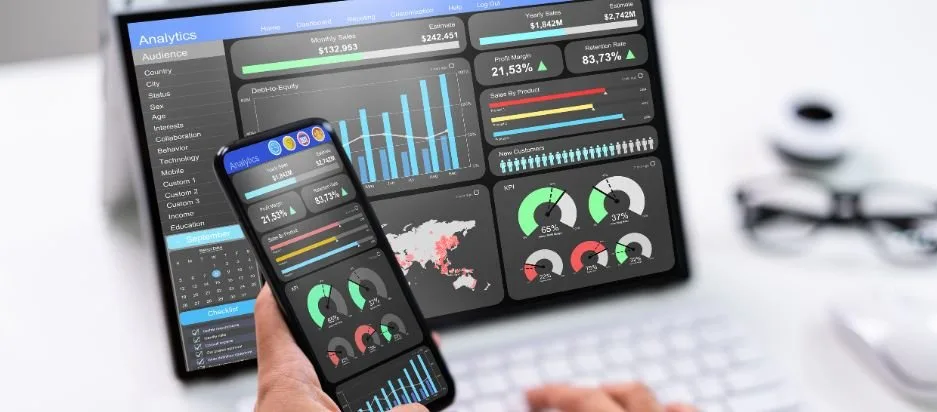
7. Creates Intuitive Business Presentations
For a long time, companies have depended on Microsoft PowerPoint for business presentations. Business dashboards can help them create the most intuitive and powerful presentations. This one thing explains why dashboards are important instruments for managing workflows.
Dashboards can turn complex data sets into the most compelling stories. A business presentation can engage your associates more if you turn its data into a sweet story. Create user-friendly graphs and charts to drive engagement levels.
You have a variety of styles when selecting the best graphs and charts to add to a business presentation. Your business presentation will surely tell a story if you choose the correct charts and graphs and add relevant data sparingly.
8. Ensures Clarity of Data
Clarity of data is one crucial reason why dashboards are important. Organizational employees have varied abilities. While some employees have many technical skills, others have nothing. As most office workers work with data, they must comprehend and interpret it correctly to avoid errors.
The Microsoft Excel spreadsheets harden this work, while dashboards simplify it. Dashboards automate data gathering and analysis, leaving workers to read it and take the most appropriate actions. They no longer must import data from various sources and later analyze it.
9. Enables Accountability
Performance measurement entails checking the things you are doing right and wrong. You can spot these areas and make necessary adjustments to boost performance using a dashboard. Moreover, you can see who made a mistake and ask them to take responsibility for it. This is why dashboards are important to businesses of all sizes. Managers can deal with the workers at fault and help them improve.

10. Reduces Frustration When Sharing Data
More on why dashboards are important, they make data sharing seamless and less frustrating. Workers send and receive emails, exchange conversations on Slack, send SMS updates to co-workers, schedule meetings, and chat on social media daily.
There is so much communication that occurs every day in the office. If you lack an efficient method of sharing messages, your workers can waste time and become unproductive. This could explain why dashboards are important.
They facilitate data sharing by offering opportunities to link to or download PDFs. You can also make any person a user or an admin. This technique works even if you must share a lot of data with several people. Everyone can access the same live reports and analytics in a split second.
How to Integrate Dashboards into Your Workflows?
So far, you have known why dashboards are important. The next thing you should do is incorporate them into your workflow. Below are the factors to consider when integrating dashboards into your workflows:
- Choose the Best Dashboards – First, understand several types of dashboards. Examine why dashboards are important and which styles suit your business needs.
- Make a Data Reviewing Plan – This will allow you to determine the type of data you will review and when.
- Design a Data Usage Strategy – Decide the correct strategy for utilizing the reviewed data to chart performance and enhance decision-making and problem-solving.
Wrapping Up
Knowing why dashboards are important is crucial if you own a business that relies on obsolete data visualization tools. Your company can reap all the benefits if you embrace dashboards. These data visualization software tools are perfect if you are desperate to enhance organizational sales revenue, profit margins, and productivity.

